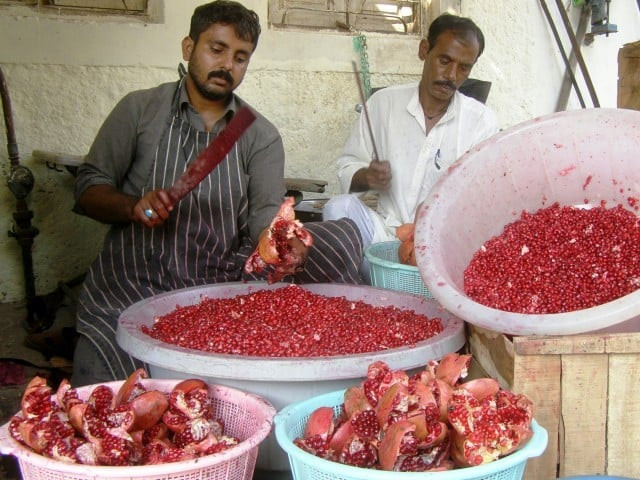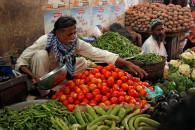Winter fruit: Pomegranate supplies from Afghanistan fall
Harvest affected by war and weather.

The supply of pomegranates from Afghanistan has fallen for various reasons and will likely result in higher prices for one of the city’s favourite seasonal fruits.
Only two trucks of pomegranates arrived in Lahore on Sunday, compared to an average of 12-14 trucks of seedless pomegranates (which come from Kapisa province in northeast Afghanistan) and 15-20 trucks of Kandahari pomegranates over the last few months. Demand for pomegranates was strong because of dengue fever, as drinking pomegranate juice is said to boost the immune system.
Merchants at the city’s fruit markets said that the supply had gone down because of greater demand in the world market, along with stresses on supply because of unseasonal rain in Afghanistan and damage to crops from chemicals and explosives used in the fighting there.
Pomegranate trader Syed Zaman Agha said that the price of the fruit in Afghanistan had increased recently but had actually fallen or stayed the same in Pakistan and India, so more fruit was staying in the country.
Agha said that unseasonal rain had ruptured the skin of Kandahari pomegranates. He said last year’s harvest was bigger. He added that chemicals used in explosives and ammunition had ruined the soil and caused the leaves of pomegranate trees to lose their colour.
Chaudhry Muhammad Aslam, a trader at Anar Mandi, said the price of good quality pomegranates remained stable (at around Rs150 per kg) but the price of low quality pomegranates was falling in Pakistan. He said small retailers had to charge high prices. “The big traders can keep the pomegranates in storage but we don’t have that option,” he said.
Merchant Spin Khan said that the quality of seedless pomegranates had fallen because of the war in the area it was cultivated. He objected to government regulation of the prices on a daily basis, “Pomegranates are not like pulses, grains and sugar. The prices should be left open to market fluctuation and the flow of supply and demand.”
Published in The Express Tribune, November 6th, 2011.



















COMMENTS
Comments are moderated and generally will be posted if they are on-topic and not abusive.
For more information, please see our Comments FAQ